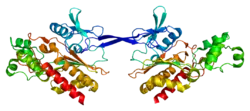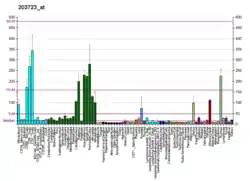Inositol-trisphosphate 3-kinase B is an enzyme that in humans is encoded by the ITPKB gene.[5][6]
Function
The protein encoded by the ITPKB gene is one of 3 isoforms of Inositol-trisphosphate 3-kinase expressed in humans. ITPKB protein regulates inositol phosphate metabolism by phosphorylation of second messenger inositol 1,4,5-trisphosphate, which releases calcium from intracellular store in the endoplasmic reticulum by gating the inositol trisphosphate receptor. ITPKB produces Ins(1,3,4,5)P4, which does not gate the inositol trisphosphate receptor. The enzyme specifically phosphorylates the 1,4,5 isomer of IP3. The activity of this encoded protein is responsible for regulating the levels of a large number of inositol polyphosphates that are important in cellular signaling. Both calcium/calmodulin and protein phosphorylation mechanisms control its activity.[7] Itpkb regulates immune cell function and is required for T and B cell development.[8]
References
- 1 2 3 GRCh38: Ensembl release 89: ENSG00000143772 - Ensembl, May 2017
- 1 2 3 GRCm38: Ensembl release 89: ENSMUSG00000038855 - Ensembl, May 2017
- ↑ "Human PubMed Reference:". National Center for Biotechnology Information, U.S. National Library of Medicine.
- ↑ "Mouse PubMed Reference:". National Center for Biotechnology Information, U.S. National Library of Medicine.
- ↑ Takazawa K, Perret J, Dumont JE, Erneux C (Oct 1991). "Molecular cloning and expression of a new putative inositol 1,4,5-trisphosphate 3-kinase isoenzyme". Biochem J. 278 (3): 883–6. doi:10.1042/bj2780883. PMC 1151429. PMID 1654894.
- ↑ Erneux C, Roeckel N, Takazawa K, Mailleux P, Vassart G, Mattei MG (Dec 1992). "Localization of the genes for human inositol 1,4,5-trisphosphate 3-kinase A (ITPKA) and B (ITPKB) to chromosome regions 15q14-q21 and 1q41-q43, respectively, by in situ hybridization". Genomics. 14 (2): 546–7. doi:10.1016/S0888-7543(05)80265-4. PMID 1330886.
- ↑ "Entrez Gene: ITPKB inositol 1,4,5-trisphosphate 3-kinase B".
- ↑ Sauer K, Cooke MP (April 2010). "Regulation of immune cell development through soluble inositol-1,3,4,5-tetrakisphosphate". Nat. Rev. Immunol. 10 (4): 257–71. doi:10.1038/nri2745. PMC 2922113. PMID 20336153.
Further reading






